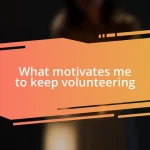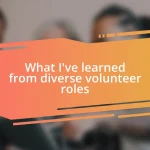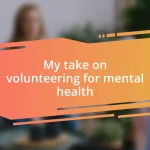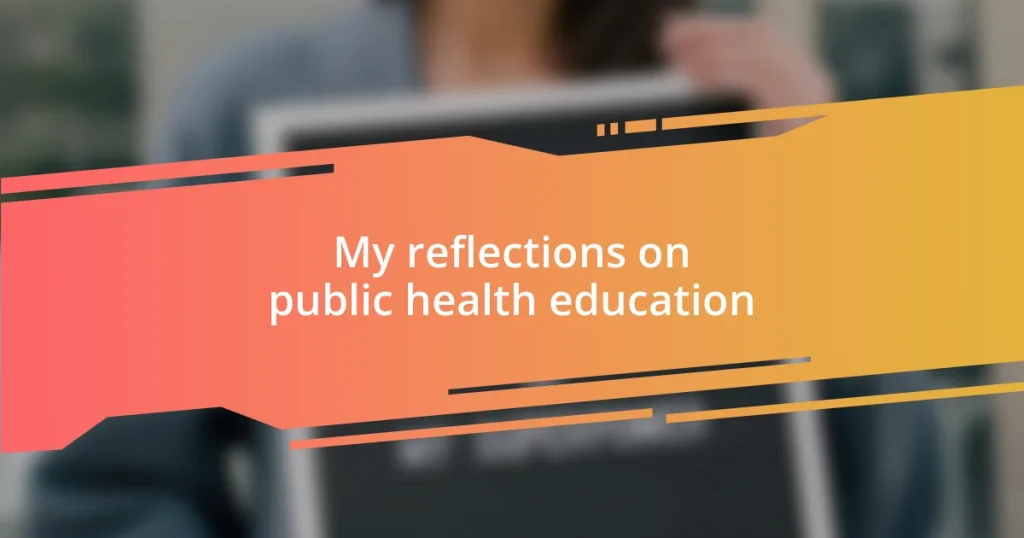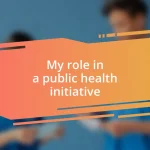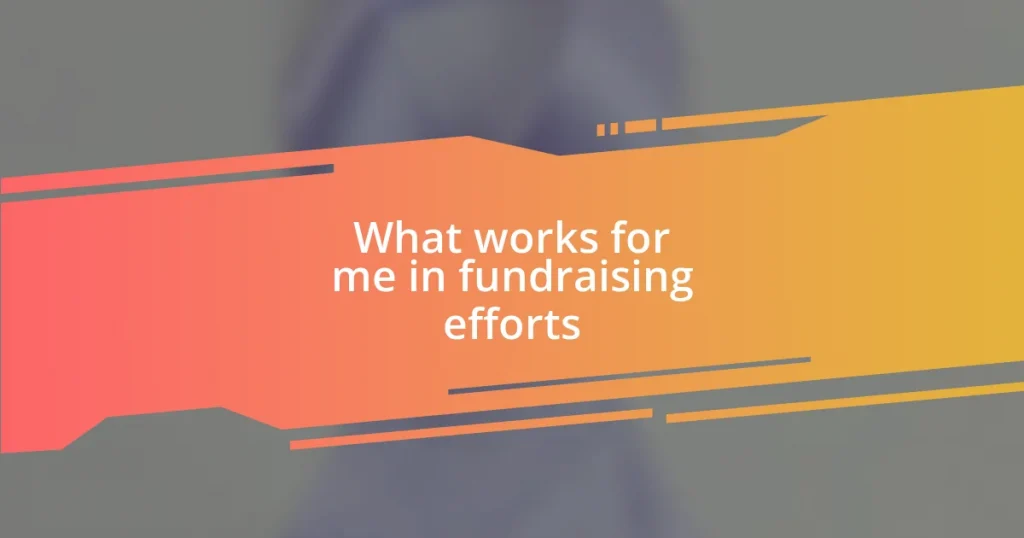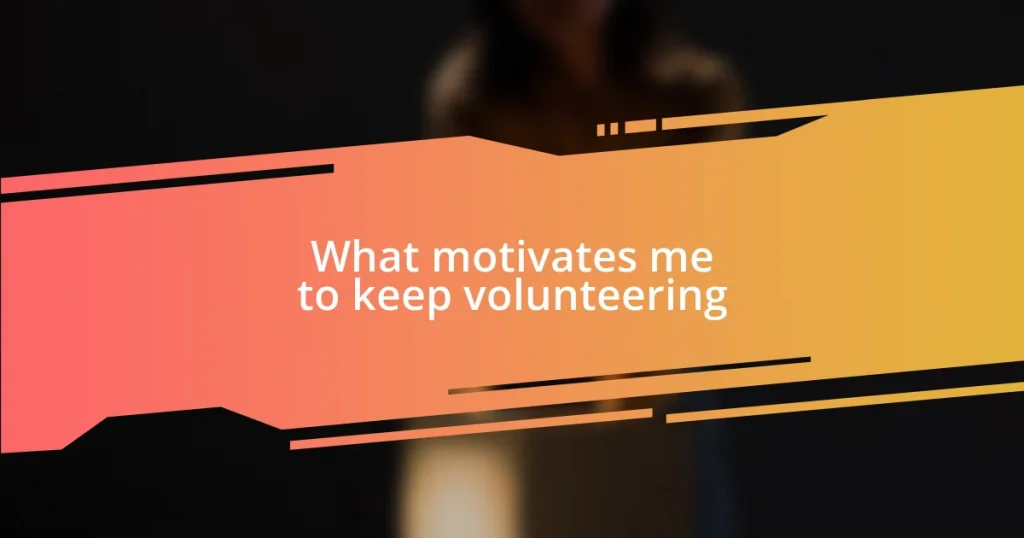Key takeaways:
- Public health education empowers individuals to make informed health decisions and fosters community collaboration, as seen in vaccination initiatives that enhance local immunization rates.
- Key principles of effective health education include accessibility, behavior change, and community involvement, which enhance understanding and trust within communities.
- Future directions for health education focus on utilizing technology, culturally tailored materials, and integrating mental health awareness to create more relevant and impactful initiatives.
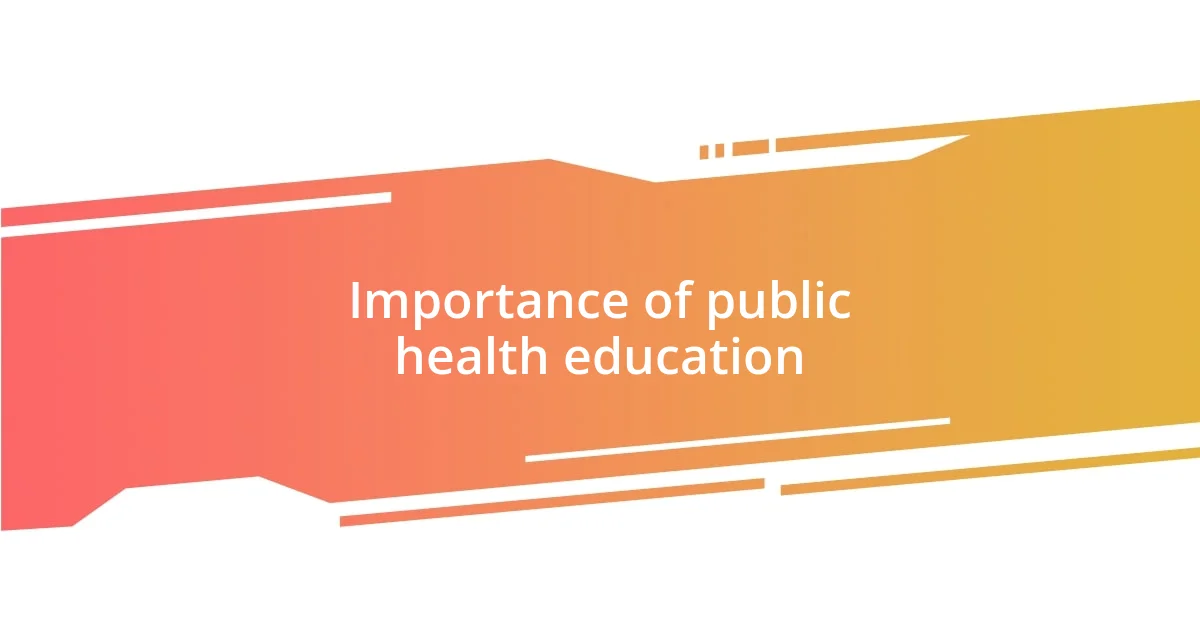
Importance of public health education
Public health education plays a pivotal role in empowering individuals to make informed health decisions. I remember a time when I attended a local health fair focused on nutrition. It struck me how many attendees were unaware of basic concepts like reading food labels or understanding the benefits of whole grains. This experience highlighted just how crucial education is in bridging knowledge gaps.
Moreover, understanding public health enables communities to work together toward common goals. During a community initiative I participated in, we shared information on vaccination importance. The enthusiasm that sparked from our discussions not only increased local immunization rates but also fostered a stronger sense of community. Isn’t it inspiring to think how awareness can transform collective well-being?
Additionally, public health education fosters resilience during crises. When the pandemic hit, I realized how vital it was for people to have access to accurate information. The difference between those who navigated the challenges effectively and those who felt lost often boiled down to their understanding of public health measures. Can you imagine how much easier it would be for everyone to cope if health education were prioritized before such crises?
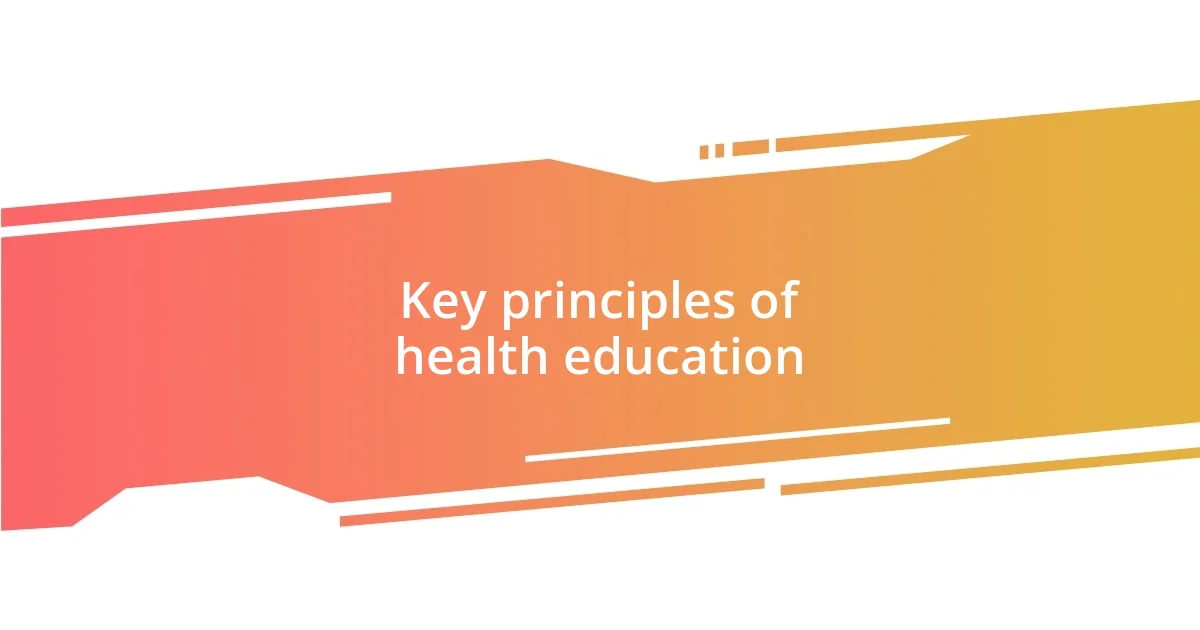
Key principles of health education
The key principles of health education revolve around accessibility, adaptability, and community involvement. I vividly recall a public workshop I attended where the facilitator tailored the content to suit the audience’s varying educational backgrounds. This experience taught me that when health education is made relatable and localized, it becomes significantly more effective. It’s crucial that resources are designed to be user-friendly, ensuring everyone can grasp important concepts.
Another essential principle is the focus on behavior change, which is at the heart of effective health education. During my time volunteering at a nutrition program, we emphasized practical strategies to integrate healthier habits into daily routines. I saw firsthand how providing simple, actionable steps empowered participants to make meaningful changes in their lives. Isn’t it fascinating how small shifts can lead to substantial health improvements over time?
Finally, a collaborative approach enriches health education. I remember participating in a series of community meetings where diverse stakeholders—from healthcare providers to local leaders—shared perspectives on wellness challenges. This collaboration not only enhanced the resources we shared but also built trust within the community. To me, fostering partnerships is vital; it’s all about uniting strengths to tackle health issues more effectively.
| Principles | Description |
|---|---|
| Accessibility | Health education should be easy to access and understand for everyone, regardless of their background. |
| Behavior Change | Effective programs focus on empowering individuals to change their behaviors through practical strategies. |
| Community Involvement | Collaboration among diverse groups strengthens health education efforts and builds trust. |
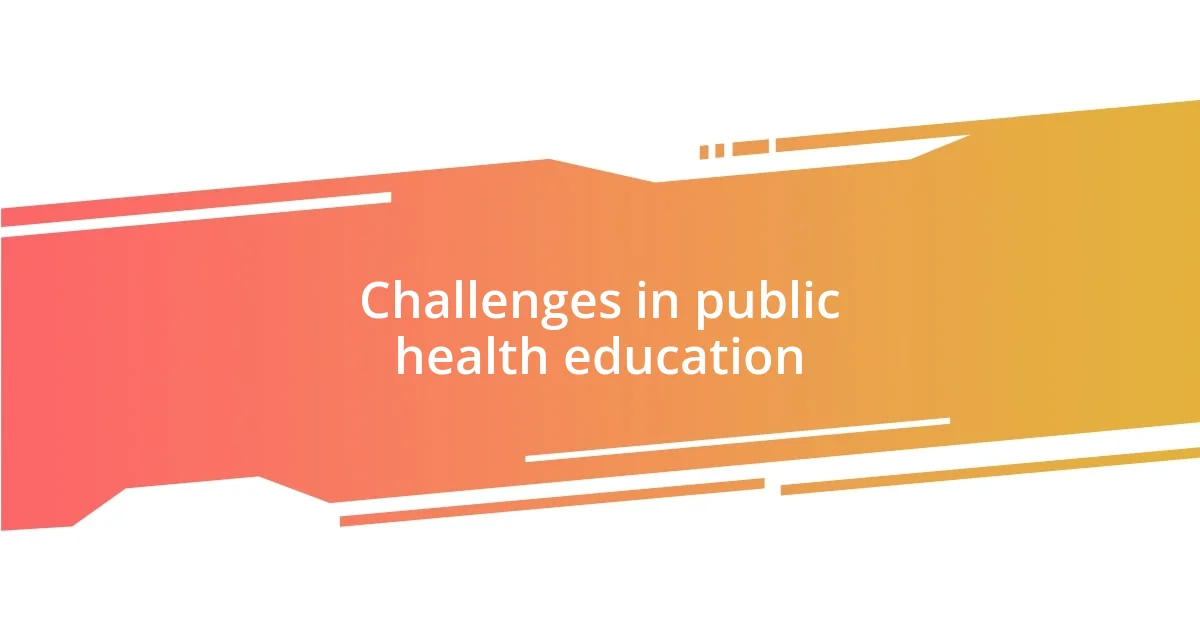
Challenges in public health education
It’s important to acknowledge the challenges that public health education faces today. One hurdle that stands out to me is the misinformation that can spread like wildfire, especially through social media. I recall a local debate around vaccine safety that escalated due to misleading reports. It was disheartening to see how quickly people could be swayed from science-based facts to unproven claims, leaving educators to play a frustrating game of catch-up in clarifying these misconceptions.
In addition, the lack of resources in underprivileged communities poses another significant challenge. I participated in a health initiative in a neighborhood with limited access to healthcare services, and it was an eye-opener. The community’s interest in learning was palpable, yet there simply weren’t enough materials or support to meet their needs. This gap is not just about access to information; it’s about creating environments where health knowledge can thrive.
Key Challenges in Public Health Education:
– Misinformation: The rapid spread of false information can undermine efforts to educate the public accurately.
– Resource Accessibility: Limited access to educational materials in underserved areas complicates the delivery of effective health education.
– Cultural Barriers: Varied cultural backgrounds influence how health information is received and understood, making it crucial to tailor messages accordingly.
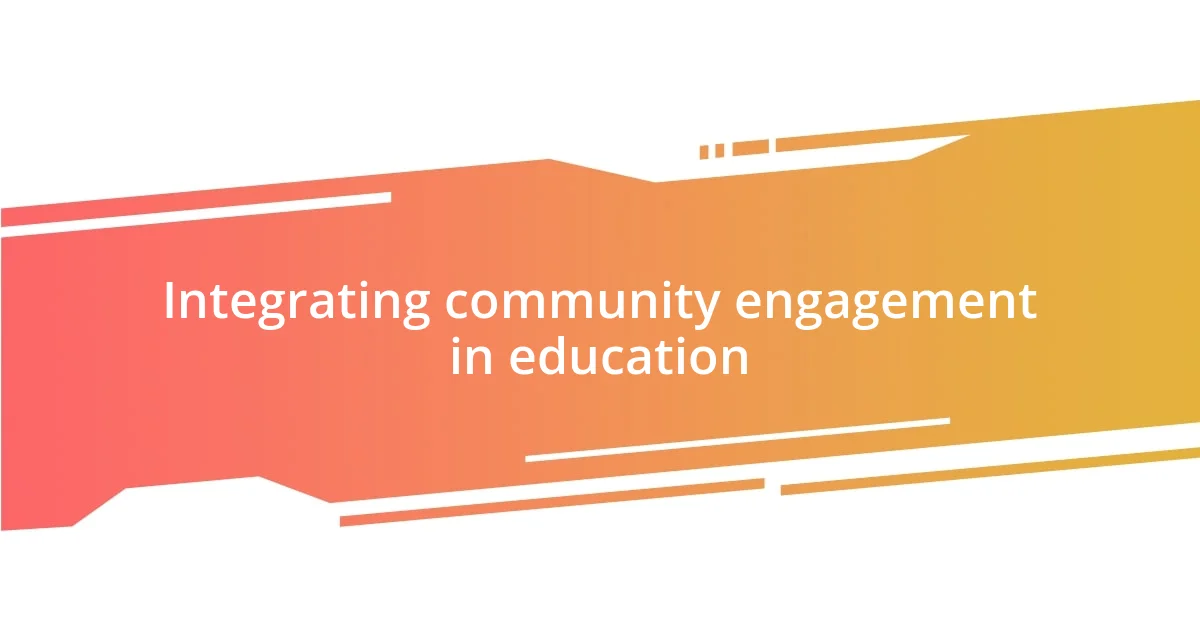
Integrating community engagement in education
Community engagement in education is pivotal for making health information resonate with diverse populations. I once organized a health fair in my neighborhood, where community members participated in designing the activities. This experience taught me that when people contribute to shaping the content and format of educational programs, they are more likely to feel invested in the outcomes. But isn’t it amazing how often education can be delivered top-down, leaving community voices unheard?
Working alongside local leaders also deepened my appreciation for collective impact. During that same health fair, we conducted focus groups to understand what health issues mattered most to residents. These conversations revealed insights that simplistic surveys would have missed entirely. It’s often through dialogue that we find common ground, and harnessing that energy can drive real change—so why not prioritize those connections?
Integrating community engagement not only enhances understanding but cultivates a sense of ownership. Reflecting on my volunteer days, I recall a workshop where participants shared their own stories about health challenges. The atmosphere shifted from passive listening to active participation, fostering a genuine camaraderie. It made me realize that education is not a mere exchange of information; it’s about building relationships and empowering individuals to take charge of their health narratives. Wouldn’t you agree that the stories we share can be just as impactful as facts and figures?
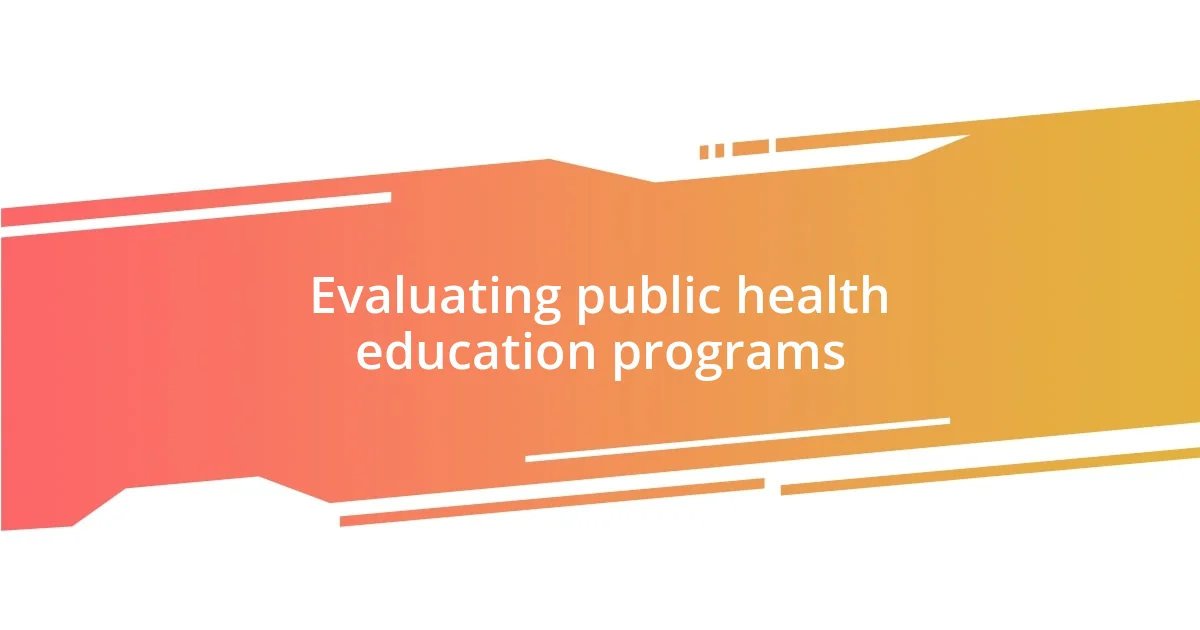
Evaluating public health education programs
Evaluating public health education programs requires a careful examination of their effectiveness. I’ve had the opportunity to assess a few initiatives, and I learned that measuring outcomes goes beyond just tallying participants. For instance, one program I evaluated aimed to improve nutrition knowledge in schools. They conducted pre- and post-surveys, but what struck me was the importance of noticing actual behavioral changes. Did students choose healthier options in the cafeteria? That observation spoke volumes about the program’s real impact.
Another crucial aspect I found is the need for feedback from participants. I remember evaluating a workshop where the facilitators were passionate but missed the mark on capturing the audience’s needs. Their enthusiasm was contagious, yet the lack of participant feedback led to repeated mistakes in subsequent sessions. Isn’t it fascinating how a simple feedback loop can transform a program? Engaging with the audience allowed us to adjust the curriculum and ultimately foster deeper understanding and engagement.
Furthermore, the long-term sustainability of these programs often goes unconsidered. During a community health fair I attended, the organizers shared their struggles to maintain momentum after the initial excitement faded. Reflecting on my experiences, I realized that embedding educational initiatives within existing community structures can create lasting change. What if we could empower local champions to keep the conversation going even after formal programs end? By investing in local leadership, we might find that public health education can flourish far beyond its initial implementation.
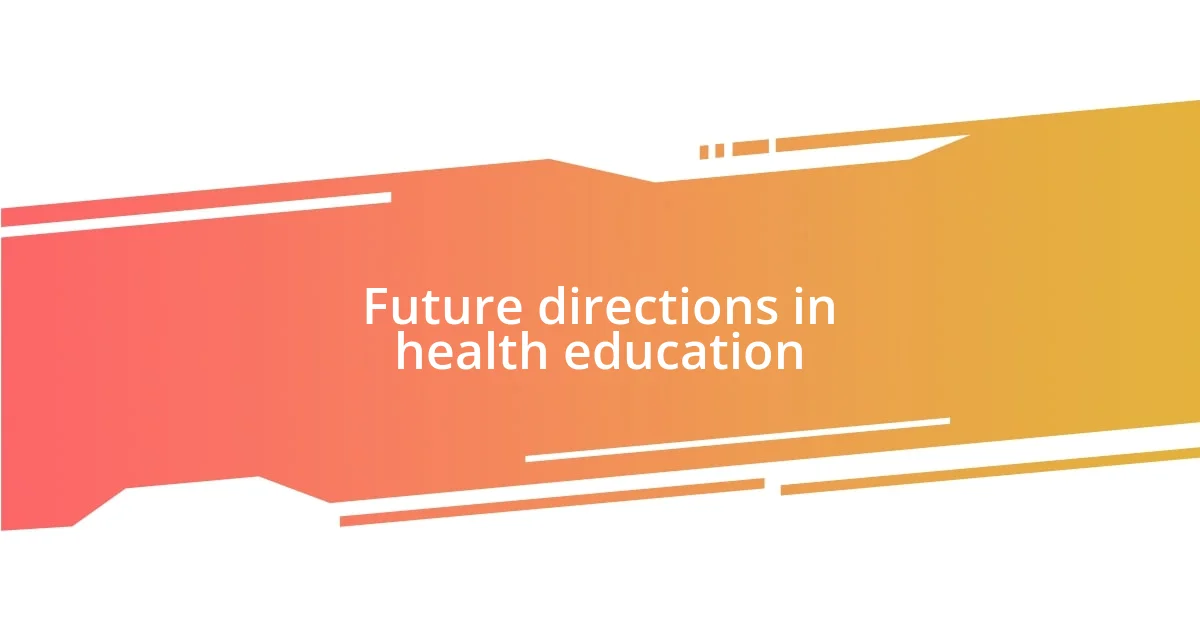
Future directions in health education
As I look towards the future of health education, it becomes clear that technology will play a pivotal role. Recently, I participated in a webinar where we explored digital platforms for health education. The interactive features made discussions lively and engaging, allowing participants from different regions to share their experiences. Isn’t it exciting to think about how technology could bridge gaps, particularly for those in remote areas?
Moreover, incorporating culturally tailored materials can reshape health education’s effectiveness. I recall attending a seminar that featured a range of case studies highlighting health programs designed for specific cultural groups. The enthusiasm was palpable as attendees shared their insights, demonstrating the profound impact culturally relevant education can have on understanding public health issues. What if we encourage more of this tailored approach? I believe it can significantly enhance the relevance and reach of health education initiatives.
Lastly, I envision a greater emphasis on mental health in public health education moving forward. The pandemic illuminated the crucial connection between physical and mental health in ways we could no longer ignore. I was struck by a series of discussions in my community about mental health’s impact on overall well-being—conversations we often shied away from before. Could integrating mental health education into schools and community programs become a new norm? If we continue to break the stigma, we might empower individuals to seek help and foster healthier communities.


